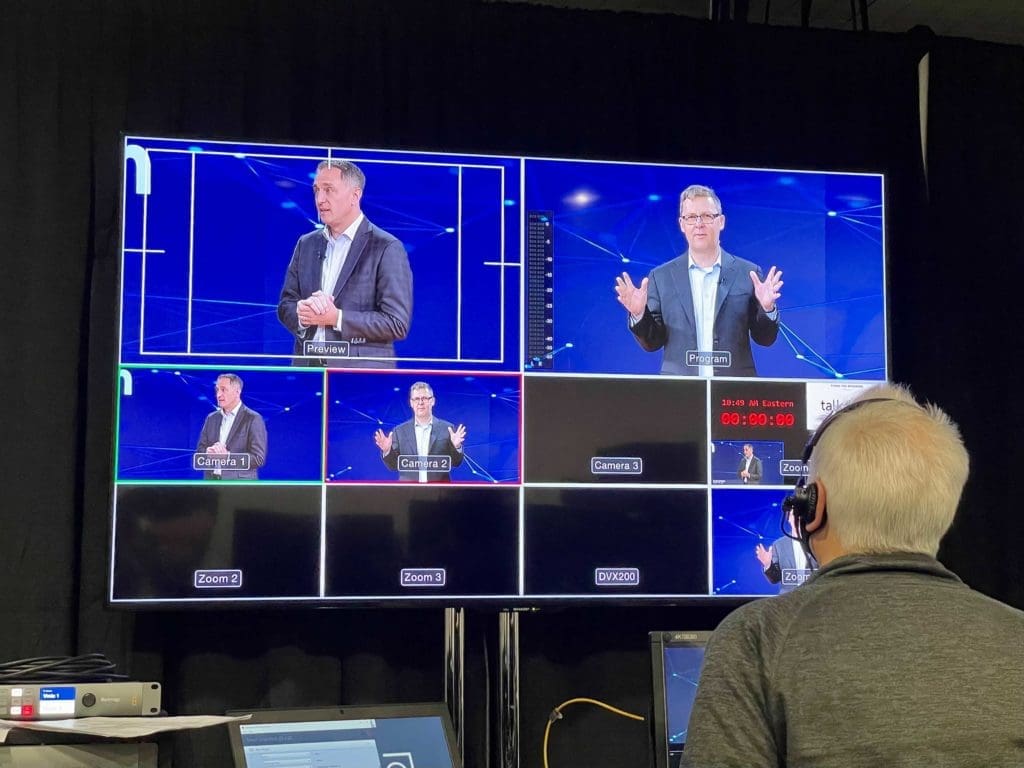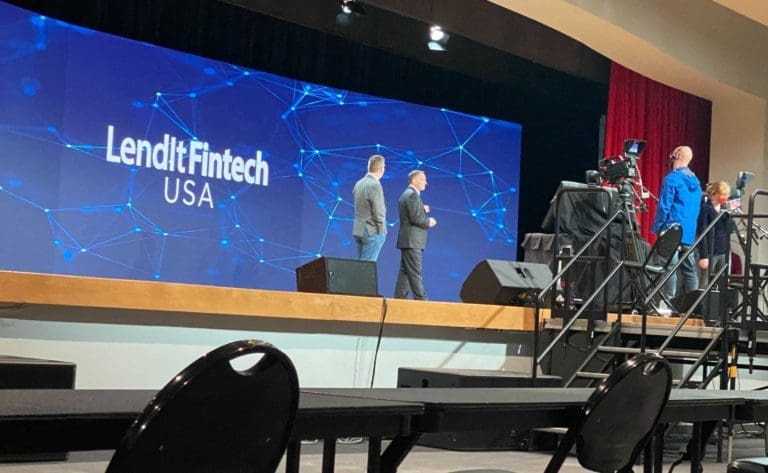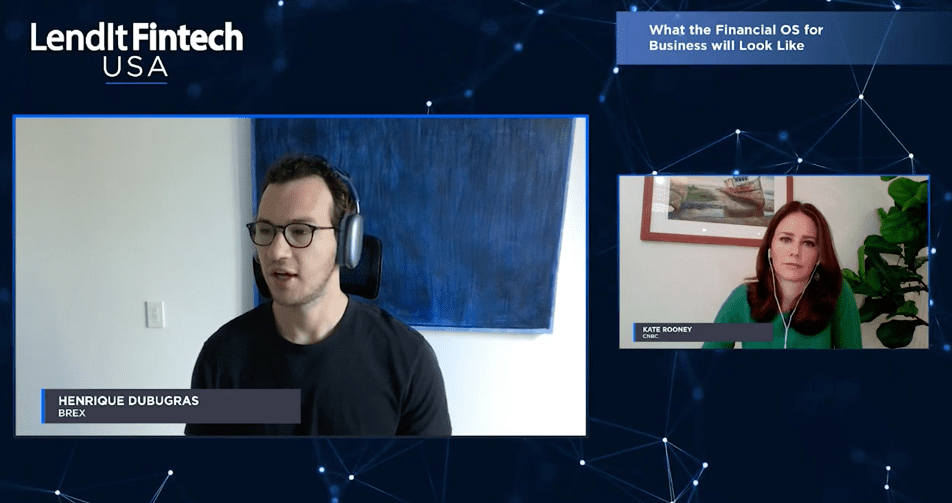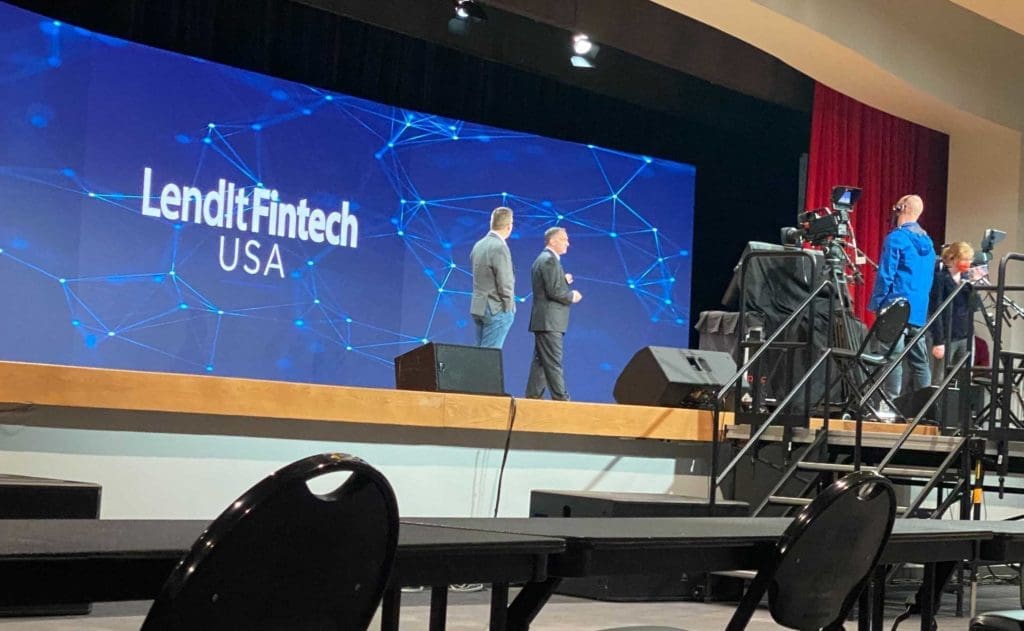
Last week the fintech world gathered online for the ninth annual LendIt Fintech USA event. We exceeded even our own high expectations as our second big online event featured many of the biggest names in fintech. Bo Brustkern and I flew to New York City (my first flight in 14 months) where we had our production studio set up inside the Javits Center. We used the keynote stage there, the exact same stage we had used for our 2017 in-person event, but the audience and speakers were 100% online.
As I do every year I will share some of the highlights from our virtual keynote stage below and you can watch our highlights video below.
https://lendit.wistia.com/medias/vn1pgu1h6u?embedType=async&videoFoam=true&videoWidth=640
We kicked things off with the hottest space in fintech, buy now pay later (BNPL). Nigel Morris, the co-founder and Managing Partner at QED Investors moderated a discussion with Adam Hughes, the CEO of Amount and Denny Nealon, the CEO of Barclays US Consumer Bank. Adam explained why BNPL is so popular today. It is all about the technology that enables a smooth user experience at checkout, so a decades old concept has seen a resurgence in the past couple of years. To coincide with their keynote, Amount and Barclays announced that they would be working together to offer BNPL solutions for Barclays merchants in one of the most significant partnerships in the space. Denny said that their the decision to offer BNPL was driven by their partners and they chose Amount so they could provide a fintech-like experience.
The inimitable Mike Cagney, CEO and co-founder of Figure, advocated for the adoption of blockchain in financial services. He explained that Figure is really now a holding company with a bunch of operating businesses, each one being built to de-risk blockchain. Mike thinks that ubiquitous blockchain adoption in financial services is inevitable although some use cases don’t make sense. He gave the example of trying to put Picasso on the blockchain, it doesn’t make sense in an analog world (although NFTs are a whole other story). There are two fundamental use cases for blockchain: 1) you can replace trust with truth, you can demonstrate and represent something as its true form, and 2) it allows for bilateral settlement, two parties can trade real time with no counter-party risk or settlement risk. By combining those two things you can create huge amounts of value across the financial ecosystem.
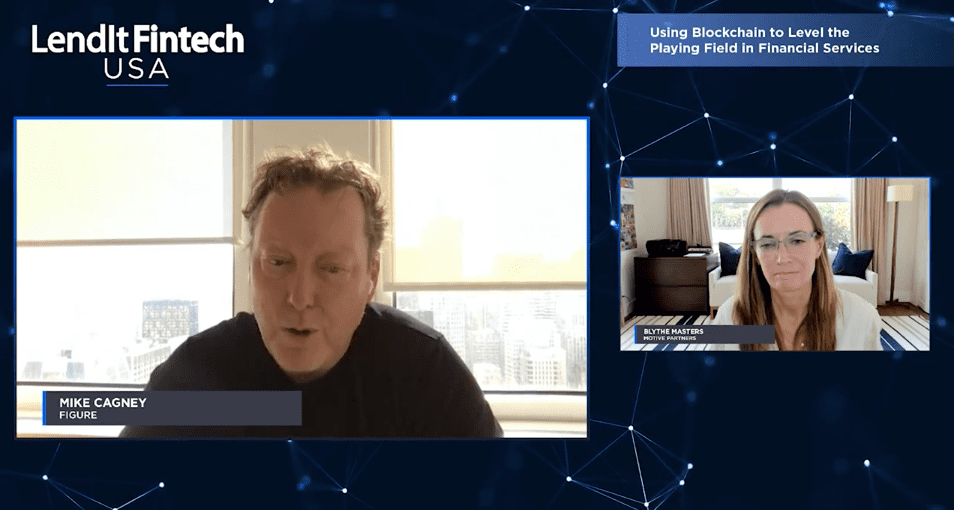
Caitlin Long is the CEO and founder of Avanti Bank, a Wyoming special purpose depository institution focused on digital assets. In October last year Avanti’s bank charter was approved by the Wyoming State Banking Board. She pointed out that digital currencies and US dollars must settle in two different entities meaning they can’t settle simultaneously. Someone must settle first so there is an enormous amount of settlement risk. This is actually the reason behind stable coins to really mitigate this settlement risk. Caitlin explained all the steps that Wyoming has taken, including enacting 24 new laws as well as changing commercial laws in order to clarify the status of digital assets and create a welcoming regulatory environment for those companies looking to custody and trade those assets.
Nick Molnar is the CEO and co-founder of Afterpay, a company that in a few short years has become one of the dominant global players in the buy now pay later space. Nick talked about the shift from the credit economy to the debit economy that is happening globally. Fully two-thirds of millennials don’t own a credit card and we have seen a significant decline in credit card usage in the US since the start of the pandemic. Interestingly he said that US retailers are more aware of this structural shift than in other parts of the world which is why Afterpay’s growth here has been the fastest they have experienced. Unlike many fintechs Afterpay is not interested in becoming a bank, they have partnered with Westpac in Australia, but they do want to offer financial services beyond buy now pay later. One word of advice he had for companies looking to expand into other offerings: you need to earn the trust and respect of your customers to scale into these new offerings.
We heard from one of the world’s leading experts on financial health, Jennifer Tescher, CEO and founder of the Financial Health Network. She pointed out that financial health is not just a marketing activity in fintech, that financial health impact can be measured. We shouldn’t be measuring NPS, we should be asking the customer whether they are satisfied with their financial situation. Financial health is an outcome, it is really the whole point of fintech and broader financial services. 80% of consumers say they want their financial institution to improve their financial health but only 14% say that it is doing so. That is a huge gap that needs to close. She gave examples of three organizations, Even, SaverLife, Regions Bank, that have been measuring their customers’ financial health in different ways. In the end it is all about trust and you build trust by measuring what matters.
I had the pleasure of interviewing Mark Begor, the CEO of Equifax, discussing the convergence of e-commerce and financial services. Talking about the impact of the pandemic on lenders, he cited the explosion in data, including alternative data and the move to all things digital, both in e-commerce and in the lending space. Consumer expectations have become formed by interacting with apps like Amazon on their mobile phones and tablets and that frictionless experience needs to come to lending. While fintech lenders have led the way in the past four to five years the large financial institutions are catching up fast. In the past year alternative data became critical as unprecedented numbers of people were laid off or furloughed – lenders needed more data than ever before to make an accurate lending decision. Beyond that, Equifax has been focused on collecting data on the 60 million unbanked or underbanked consumers to expand access to credit.
The Co-Chief Information Officer at Goldman Sachs, Marco Argenti, discussed the new financial cloud that is being built at Goldman and how it is for fintechs, big tech companies and banks. The financial cloud is Goldman’s banking-as-a-service offering and Marco noted that it had two characteristics: 1) it is a product for developers, they are at the forefront as a new class of customers for Goldman Sachs and 2) there is an indirect business component to this as well – the example he gave was with Stripe where Goldman is helping to power some of their lending and payments capabilities that they can then offer to their own clients. Marco noted what a huge opportunity this is because most companies are going to need to offer some kind of financial services to their clients. Goldman is very much focused on having a developer experience that is on par with the tech companies and with their deep experience in banking that is a powerful combination.
Dontá Wilson is the chief digital and client experience officer at Truist (the sixth largest bank in the US) and he discussed how to humanize banking in the digital world. He said that trust is at the core of providing a good customer experience and Truist wants to engage with their customers in whatever channel they choose. The options need to be transparent so clients can interact with a virtual agent or if they prefer, they can speak with a person. Part of their new system will include an overdraft warning where a client can engage with Truist after being notified they are about to overdraw their account. Humanizing the digital experience is not so much about the technology because that changes, it is about the experience design techniques you are using to make it feel more human.
Colin Walsh, the CEO and co-founder of Varo Bank, is a pioneer in the digital banking space with the first national bank charter for a retail digital bank. He discussed with Jo Ann Barefoot the idea that banks can break down barriers for financial equality. Colin deeply believes that banking can be a real force for good and it can bring greater justice and equity to society and as a result of that Varo was born. As a bank they want to bring financial opportunity for everyone. There are three ways to address this financial inequality: 1) Smoothing the income volatility by providing early paydays and faster access to money, 2) Providing better access to credit, banks should extend credit to much larger segment of the population, and 3)Savings and financial resiliency – help consumers build savings habits. The confluence of mobile, cloud computing, the use of AI and big data allows banks to lower the cost of serving their customers and the speed of innovation allows digital banks to deliver new products quicker. These developments, when combined with a mission to reduce financial inequality can break down the barriers that have been inherent in our banking system.
Henrique Dubugras is the CEO and co-founder of Brex and he discussed the financial operating system (OS) for business. He gave Apple as an example of a company that deeply integrated hardware and software and what Brex is trying to do is something similar for businesses. They are integrating disparate financial services (like bank accounts, credit cards, lending, etc.) with financial software (the software companies use to manage their business) into a financial OS. Being deeply integrated on the software side allows the financial services to talk to each other which leads to a better user experience for the customer. Henrique also discussed the bank charter application explaining that the main reason to get it was to be able to lend to their customers because so many small businesses are underserved still today when it comes to credit. He had an interesting take on data sharing, maintaining that no data is really the bank’s data, it is the customer’s data and they should decide if and when it gets shared. I loved his take on the meteoric rise in fintech valuations recently, he said that banks have massive market caps with large profits and some of these profits will inevitably flow to fintechs.
Steve Smith, the CEO and co-founder of Finicity, talked about open banking and credit decisioning. The main problem with traditional credit scoring is that it is a lagging indicator and doesn’t include a 360-view of the borrower. Open banking provides the possibility for consumers to grant access to real time data that will provide a much more accurate view, by allowing lenders to look at income and how the consumer manages cash flow. Millennials are slow to enter the credit system, often caused by student loan debt, which makes them hard to underwrite so again more data is needed to make an accurate credit decision for this population. Fintech lenders have shown a willingness to use open banking data which is putting pressure on the legacy credit scoring system. The more we see consumer cash flow data used here the more it will become entrenched and the standard for underwriting going forward.
Steve McLaughlin, the CEO and founder of FT Partners, and Betsy Cohen, the Chairman of Fintech Masala, discussed special purpose acquisition companies (SPACs) and their role in fintech. Both are SPAC veterans with Betsy working on SPAC number 11 right now and FT Partners having been involved in many SPAC deals and now with their own SPAC in market. They talked about why SPACs have suddenly become hot in the past 12 months particularly in the fintech space. The SPAC structure allows for a more negotiated transaction akin to an M&A deal where the acquirer can dig into the projections of the company. Betsy talked about the very recent slowdown in SPAC activity, primarily as a result of the recent SEC accounting change. But SPACs will remain a popular choice for certain types of companies that want a simpler and more direct route to the public markets.
Networking and More
We had great content on our breakout tracks all three days and the videos are now available to be viewed on Brella for all registered attendees. As with every LendIt event networking was a priority with many different ways to interact with fellow attendees. More than 7,000 meetings were setup last week with the community using this time to make new connections. We also had our ever popular Women in Fintech Power Hour and multiple other “speed dating” type events over the course of the three days.
While everyone I chatted with was anxious to get back to in-person events we were pleasantly surprised that after 14 months of interacting virtually people were very much engaged in both the content, the networking and the Solutions Center. This will likely be the last big virtual event we ever do so it was good to go out on a high note.
Thanks to everyone who attended and the sponsors for their support. We will back in person in New York next spring. In the meantime, we have a special in-person networking event coming up in Miami in September we are calling Nexus.
